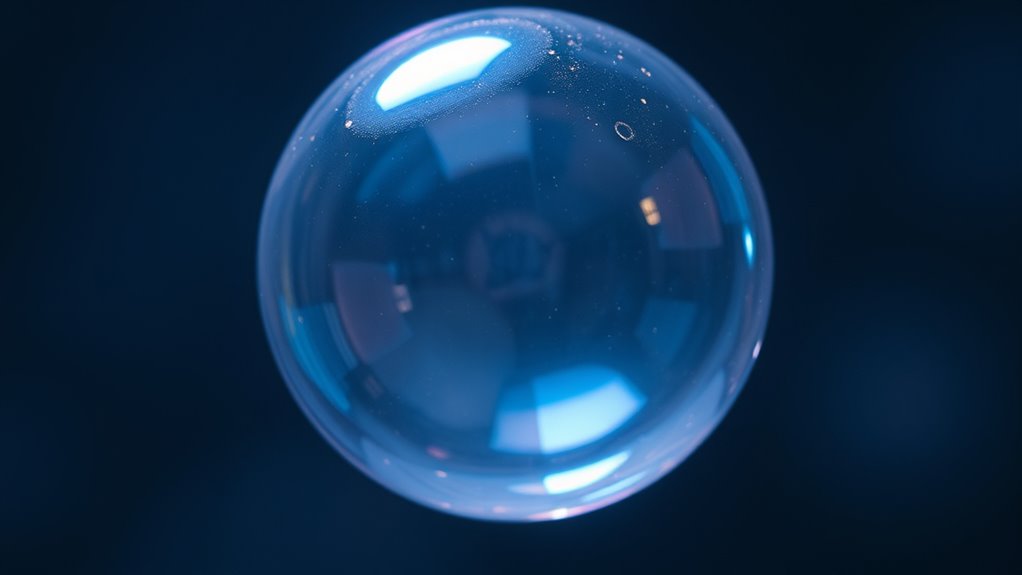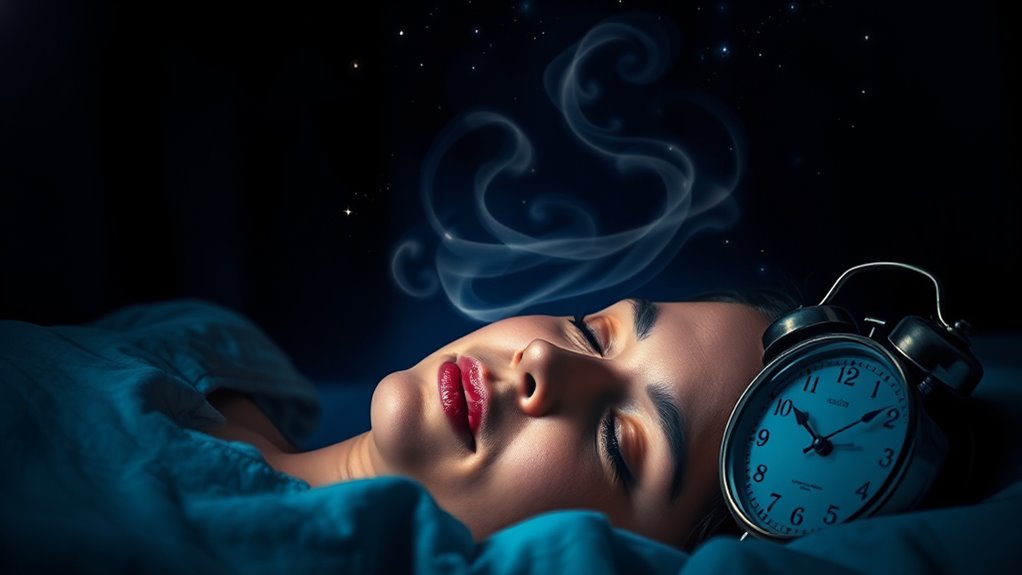Dreams usually last only a few seconds to a few minutes in real time, mainly during REM sleep stages. But because your brain creates vivid stories and memories during sleep, these dreams can feel much longer, sometimes lasting 20 to 30 minutes. The perception of extended time happens even though the actual duration is short. Want to understand why your dreams seem so prolonged? Keep exploring to uncover the fascinating details behind this illusion.
Key Takeaways
- Dreams mainly occur during REM sleep, which lasts about 90 minutes per cycle and varies throughout the night.
- Early REM dreams last only a few seconds to a minute, while later REM stages can produce dreams lasting 20 to 30 minutes.
- The perceived length of dreams is often longer than their actual duration due to brain processing and narrative construction.
- Waking during REM or immediately after dreaming enhances recall and can make dreams feel more extended.
- Overall, actual dream episodes tend to last only a few minutes, but they can feel much longer due to perception and memory factors.

Have you ever wondered how long a dream actually lasts? The answer isn’t as simple as you might think. Dreams typically occur during REM (rapid eye movement) sleep, which is just one part of your sleep cycle. Your sleep cycles last about 90 minutes each and include stages of light sleep, deep sleep, and REM sleep. During REM, your brain becomes highly active, and that’s when most dreaming happens. Curiously, the duration of dreams tends to increase as the night progresses. Early in the night, dreams might only last a few seconds to a minute, but in the later REM stages, they can stretch to 20 or even 30 minutes. This variability can make it seem like dreams last longer than they actually do, especially since our perception of time during sleep isn’t accurate.
Dream recall plays a significant role in how you perceive the length of your dreams. If you wake up during or right after REM sleep, you’re more likely to remember your dreams clearly. When you recall a dream, it can seem vivid and lengthy, but in reality, it might have only lasted a few moments within the sleep cycle. The way your brain consolidates memories during sleep influences how much of the dream you remember and how long it appears to have lasted. If you wake up naturally or are jolted from REM sleep, you might remember more details, giving the impression of a longer, more elaborate dream. Conversely, if you wake during non-REM stages, dream recall tends to be limited, and you might forget your dreams altogether.
Additionally, sleep cycles and their structure impact how dreams are experienced and remembered, contributing to their perceived duration. Furthermore, your perception of how long a dream lasts can be distorted by the brain’s processing. While dreams usually span only a few minutes in real time, your mind often fabricates a story that feels much longer. This is partly because your brain constructs narratives to make sense of the dream experience, stretching the sense of time within the dream itself. So, even if a dream only lasts a couple of minutes in reality, you might experience it as lasting much longer when you wake up. The intricacies of sleep cycles and dream recall create this fascinating illusion—dreams seem to stretch on, even though they’re often brief episodes within your sleep pattern.
Frequently Asked Questions
Can Dreams Last for Days or Weeks?
Dreams cannot last for days or weeks because they occur during sleep cycles, which typically last about 90 minutes each. Your dream duration is usually just a few minutes within a single sleep cycle. While you might experience a series of dreams over a night, each one is short, and even the longest dreams rarely extend beyond 20-30 minutes. Your brain quickly shifts between dreaming and waking states.
Do Nightmares Tend to Last Longer Than Pleasant Dreams?
Nightmares often feel longer than pleasant dreams because of their intense dream content and heightened emotional impact, which boost dream intensity. You might recall nightmares more vividly, making them seem more prolonged. Your dream recall plays a role too—distressing dreams tend to stick with you, making them seem like they last longer. So, yes, nightmares can seem to last longer due to their emotional intensity and how well you remember them.
Does Sleep Quality Affect How Long Dreams Are Remembered?
Ever wonder if your sleep quality influences how long you remember dreams? It does—better sleep and consistent sleep stages, especially REM, boost your dream recall. When sleep is fragmented or poor, you might forget dreams quickly, like trying to catch smoke. Quality sleep helps your brain process and store memories of dreams more effectively, making those vivid nighttime stories stick with you longer. So, prioritize good sleep for better dream recall.
Are There Ways to Control or Extend Dream Duration?
You can control or extend dream duration through lucid dreaming and dream manipulation techniques. By practicing reality checks and maintaining awareness during REM sleep, you increase your chances of becoming lucid within a dream. Once lucid, you can actively influence the dream’s length and content, making it feel longer. Consistent practice of these methods helps you gain better control over your dreams, allowing you to enjoy extended, more vivid dream experiences.
How Does Age Influence the Length of Dreams?
Imagine you’re a 1920s flapper, and your dream recall changes with age. As you grow older, your dreams tend to become shorter, often lasting just a few seconds, due to age-related changes in sleep patterns. Younger people usually experience longer, more vivid dreams. Your ability to remember dreams also declines with age, making it harder to recall how long dreams last, especially as your sleep cycles shift over the years.
Conclusion
So, next time you wake up wondering how long that amazing dream lasted, remember it’s likely just a few minutes, even if it felt longer. Some experts believe our dreams can stretch from seconds to about 20 minutes, but there’s no solid proof. It’s fun to imagine that your wildest dreams might be more fleeting than you think. Keep exploring, and maybe you’ll catch a glimpse of how your mind creates those fascinating stories in mere moments.









